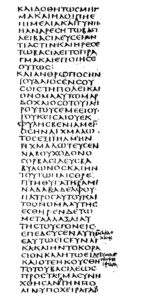I recently gave a presentation to a group of parents of school children enrolled in Chatham County Schools’ English Language Acquisition program. They wanted to know how children qualify for help acquiring English, how the program works once they qualify, how they exit the program when their English is good enough, etc. In answering that last questions, I addressed something that I have long wanted to write about in regards to ancient language acquisition–particularly acquiring Ancient Greek. So… here we go.
BICS and CALP

In 1979 Jim Cummins, professor at the University of Toronto, coined these two acronyms to distinguish between two very different levels of language competence observed in students acquiring English.
BICS means Basic Interpersonal Communicative Skills, while CALP is an acronym for Cognitive Academic Language Proficiency, now commonly referred to simply as Academic Language Proficiency. Cummins observed, along with others working in applied linguistics, that students rapidly reach the ability to converse with their peers and even do a reasonable job of functioning at school and sounding fluent, but their academic performance often lagged far behind their native speaking companions.
The distinction between BICS – acquired rapidly through oral interaction – and CALP – which requires considerable effort and much more time to acquire – has stood the test of time, remaining a fundamental distinction in studies of modern language acquisition. Since Cummins’ initial proposal the distinction has been applied not only to the acquisition of an additional language beyond the one developed as a child. It can even apply to monolingual speakers of English (Spanish, German, or any other present-day language.).

Almost everyone, absent a major cognitive impairment, acquires BICS. This is the language of everyday life, the way children talk to each other and to their parents and the way adults speak to each other in day to day conversation. BICS is all that is necessary for many jobs, for example. You can wash cars, work at a fast-food restaurant, gather crops, and perform many other jobs without the need of much academic language. As we all know, though, these are the lower-wage jobs.
If you want to work in a more demanding and higher paying setting, you generally need CALP. If you interview for a job as a Finance Manager, BICS will usually not be enough. The only jobs available to you at an institution of higher education if you only have BICS are the service jobs. Certainly prejudicial attitudes play into this, but no matter the race or ethnicity of the applicant, Professor, Department Chair, President, IT Specialist simply don’t go to applicants without CALP. It has to do with your ability to do the job. You need CALP for sophisticated and highly technical enterprises.
So What?
What does this distinction have to do with acquiring Ancient Greek?
For generations Ancient Greek was taught almost exclusively through memorization of forms, paradigms, and lists of vocabulary. Nobody ever learns or learned real fluency that way, but a fair number of gifted students managed to acquire the ability to read Ancient Greek texts with the aid of a good lexicon and a reference grammar. An embarrassingly large percentage of students never even managed this rather limited ability. Nobody, not even those gifted students, could develop BICS in this manner, much less CALP.
Thankfully, that is changing. Some magnificent work is being done to teach Ancient Greek in Ancient Greek, with students actually acquiring the ability to speak the language as well as read it without the need of frequent reference to a lexicon or grammar. This work was pioneered by Randall Buth who founded the Biblical Language Center in Israel more than two decades ago.
It is in this new context that I wish to address the question of BICS and CALP. Scholars have long recognized the variety of language registers embedded in the Greek New Testament. Reading Mark’s Gospel is an experience quite unlike reading Luke-Acts, for example. While slogging through Mark after only one year of elementary Greek is a possibility, making it through Luke, Acts, or Hebrews is not. The authors of these last mentioned documents wrote with a variety of vocabulary and sentence structure much more demanding than most of the rest of the New Testament. They had Ancient Greek’s version of CALP.
The ability to speak fluently in Ancient Greek will not insure an understanding of that register of Ancient Greek literature, though it is certainly a good start. To produce CALP, listening and speaking in class must move beyond conversational fluency to include both reading and writing with high standards.
This is a self-criticism, by the way. I have a long way to go before even being conversationally fluent in Greek. I am bilingual and biliterate—able to understand what I hear, make myself understood in speech like a native, read with understanding, and write at a reasonably high level in both English and Spanish—but I only read Ancient Greek. I hope to change that.
Resources are becoming more and more available to help with this goal. I discovered this week Seumas Macdonald’s Ἡ Ἐλληνικὴ γλῶσσα καθ᾿ αὑτὴν φωτιζομένη (aka) Lingua Graeca Per Se Illustrata. What a gift to the world of Ancient Greek students! It’s released with a CC BY-SA 4.0 license!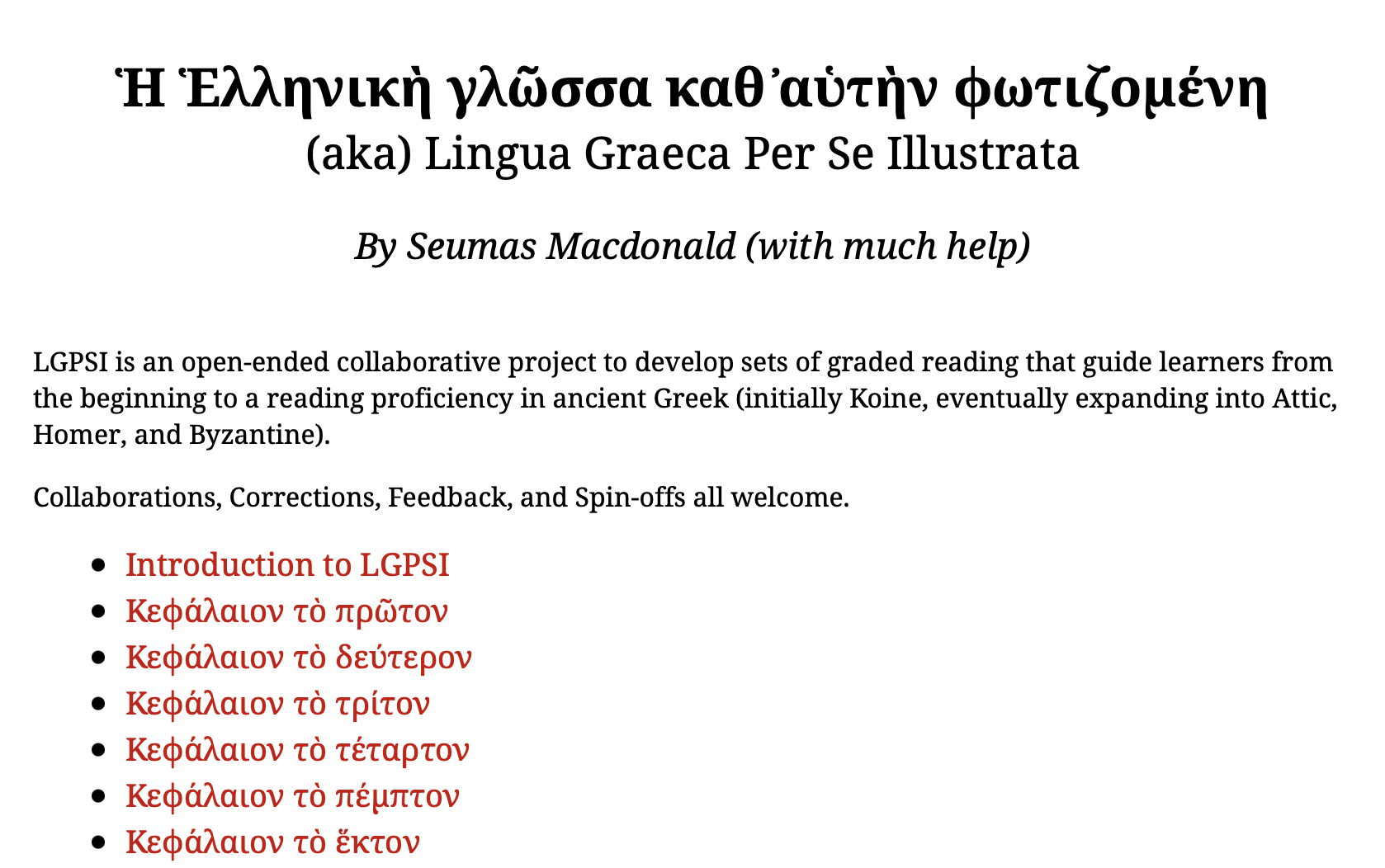
As Seumas himself acknowledges, the work is not ready to use as a stand-alone tool for teaching yourself Ancient Greek, but it certainly is a major help for anyone already started on that learning journey and looking for some good reading practice that doesn’t require reference to English explanations. I can also envision how it could be incorporated into an in-person learning experience with the teacher using the communicative method. Have the students read each chapter of Seumas’ work, then discuss it in class in Greek. This would require a good bit of preparation on the teacher’s part, but it would be worth it!
Another great resource available online—this one not free unfortunately—is Biblingo. The four and a half minute video below gives an overview of the method and its goals. Whether or not you agree with the theology that drives their work, the method is what is of interest here. The video is an ad, but you can get an idea of how the program works.
The course includes audio and video and requires the user to write in Greek, beginning with very simple structures and increasing in complexity as you advance through the course. This also could be adapted for use in a classroom setting, having students complete lessons on their own, and designing communicative classroom experiences to take advantage of what they have learned.
Another online course with a good bit of material already developed is Benjamin Kantor’s work at KoineGreek.com in association with the Biblical Language Center. You can see his introductory video below to get an idea of what to expect.
All of these online resources represent a great step forward in terms of fluency. Other programs that can accomplish the same, such as the Polis Institute and one of the options at the Biblical Language Center, use the communicative method in particular locations requiring travel to the course location site.
I am unable to travel to those sites, but I’m excited to see the communicative method showing up increasingly in online resources. My own personal goal goes well beyond oral fluency (BICS) to include the ability to read and write the way I can in English and Spanish (CALP). That requires, in addition to working on oral fluency, reading roughly contemporary works outside the canon, reading to learn rather than just learning to read.
Maybe one day I’ll get there. But there will always be more to learn.
If you are learning Ancient Greek using the communicative method, please feel free to comment telling us what you are using and where you are studying.

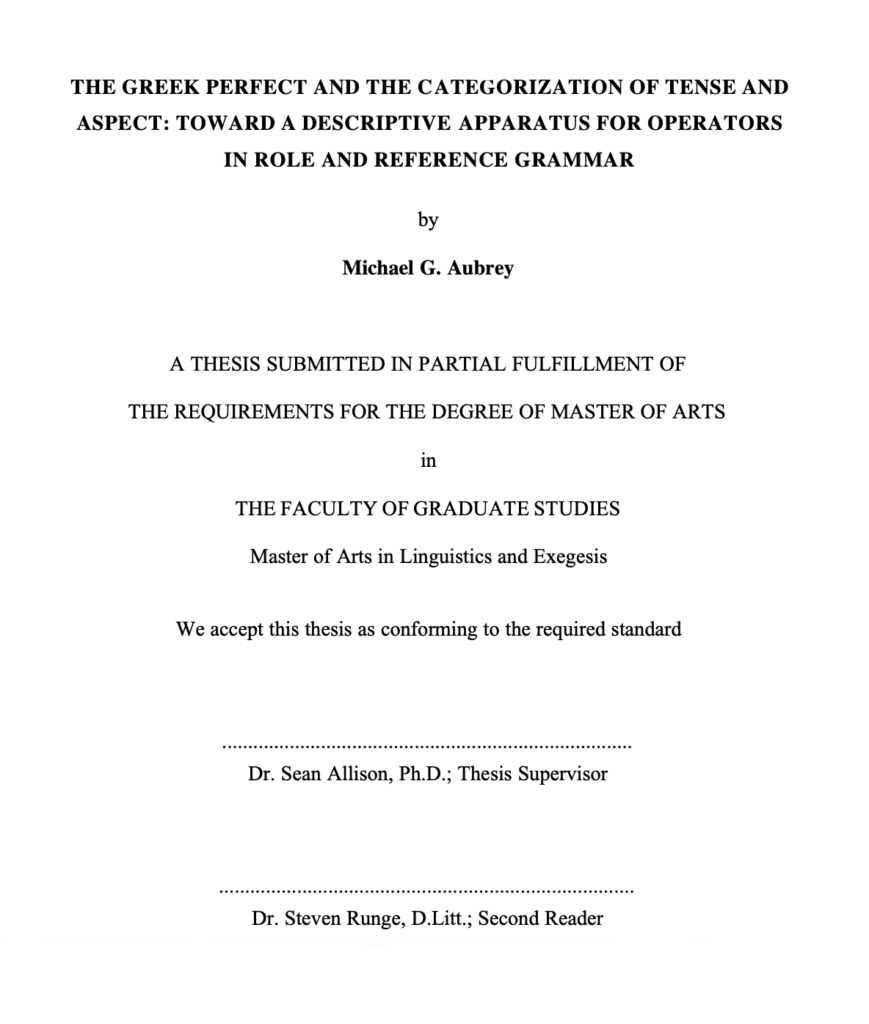

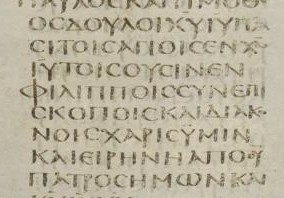
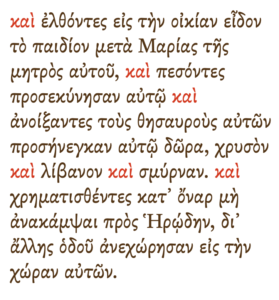 Earlier today, Eric Rasmusen posted the following comment in the Punctuation in Ancient Greek Texts discussion. While his comment is related to that topic, it raises a question more specific to the usage of
Earlier today, Eric Rasmusen posted the following comment in the Punctuation in Ancient Greek Texts discussion. While his comment is related to that topic, it raises a question more specific to the usage of 